The IICD Celebrates Women's History Month: Spotlight IICD Scientists
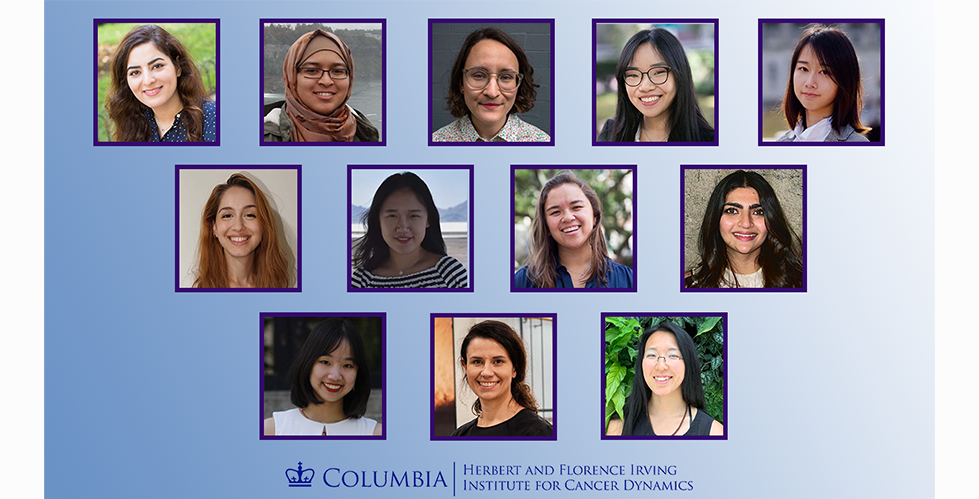
In honor of Women’s History Month, we are highlighting the outstanding scientists who are part of IICD. They share about their journey in STEM, the challenges they encounter and their proudest achievements. Follow @cancer_dynamics on Twitter and Instagram. Interviews are released every week throughout the month of March. This article is updated from March 2022 to include five new researchers who joined the IICD over the last year.
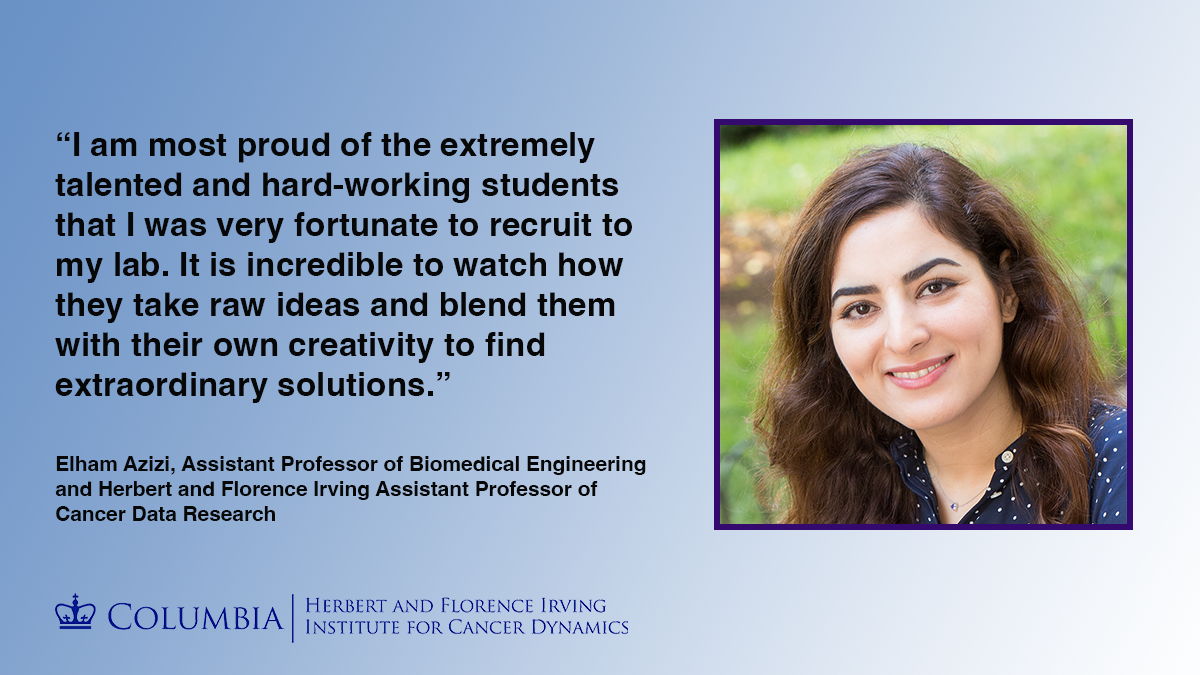
1. Tell us about your background/career path.
My career started in electrical engineering (signal processing) and I moved to statistical machine learning and computational biology during my graduate studies. Fascinated by the complexity of genomic data in cancer, I focused on building machine learning methods for analyzing single-cell resolution genomic data from cancer patients during my postdoctoral training. Currently, my lab continues the direction of combining innovative machine learning and cutting-edge genomics and imaging to unravel the dynamics and interactions between cancer cells and immune cells directly in patient tumor samples. Our goal is to understand the underpinnings of anti-tumor immunity and cancer progression.
2. What inspired you to pursue a career in STEM?
I was always curious about how physical and natural systems work, but also loved the elegance and power of abstraction in mathematical modeling and systems identification approaches in engineering. During my graduate studies, I sought to find a field that combines these concepts motivated by improving human health and the potential to save lives. I came to realize, however, that modeling complex biological systems is not as straightforward, but with the rapid growth in scale and dimension of genomic data, we have the incredible opportunity to leverage machine learning and statistics for this purpose.
3. What challenges did you encounter, and how did you overcome them?
Changing fields and creating my own path in graduate school was very exciting but also intimidating at the beginning. I was fortunate to have fantastic advisors and a great support network, especially my husband who has always encouraged me to be bold, explore the unknown, and find creative solutions.
Another constant challenge has been dealing with usually unintentional biases and microaggressions in particular in male-dominated fields such as engineering. Finding good mentors has been instrumental in overcoming these challenges and building confidence.
4. What achievement(s)/milestone(s) are you the proudest, career-wise or in your personal life?
I am most proud of the extremely talented and hard-working students that I was very fortunate to recruit to my lab. It is incredible to watch how they take raw ideas and blend them with their own creativity to find extraordinary solutions.
5. Do/did you have any role model(s)?
My postdoc mentor Dana Pe’er, a pioneer and leader in the field of computational biology, has largely influenced my path. Also Maryam Mirzakhani, the first woman to win the mathematics Fields Medal has greatly inspired me. Her photo hanging on the alumni wall of our high school was a reminder that anything is possible with curiosity and persistence.
6. Would you have any advice for young women who consider pursuing a career in STEM?
Do not be afraid to explore new fields, and find good mentors and role models to guide you in mapping your career trajectory!
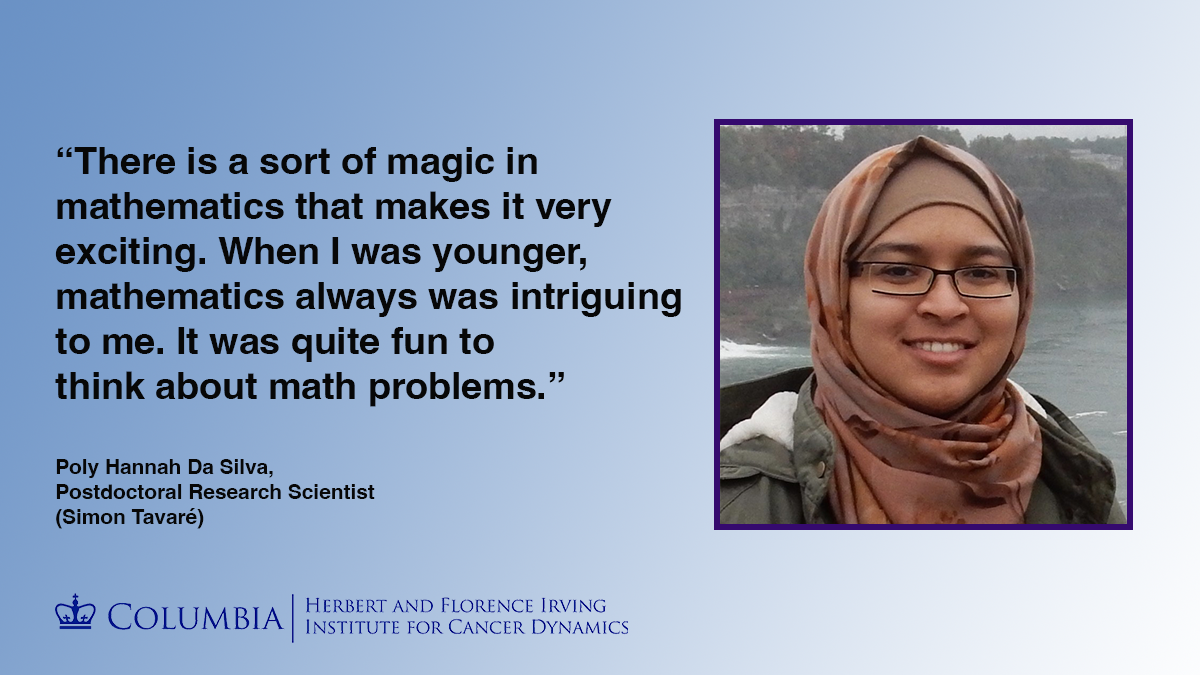
1. Tell us about your background/career path.
My background is in Mathematics and its applications in various problems in biology. During my master I studied some problems in genome rearrangements and phylogeny reconstruction using discrete math and combinatorics. Later on, in my PhD, I started working on probabilistic models and methods both in genomics and population genetics. Now I’m trying to apply all these methods to cancer evolution.
2. What inspired you to pursue a career in STEM?
There is a sort of magic in mathematics that makes it very exciting. I think many people, even those who are not really fans of mathematics, feel happy after solving a mathematical problem. When I was younger, mathematics always was intriguing to me. It was quite fun to think about math problems. So from the very beginning, I got really excited to become a researcher, especially after I realized that mathematics can be applied and be useful in a wide range of real life problems, such as in biology and science, finance, engineering and much more.
3. What challenges did you encounter, and how did you overcome them?
In general, scientific life can be very challenging. Scientists should always be hard working and persistent to solve and overcome scientific obstacles in their research. Usually, important results in science and in particular mathematics are discovered after a huge amount of effort.
4. What achievement(s)/milestone(s) are you the proudest, career-wise or in your personal life?
I can’t name any particular one that I’m the proudest for, but I feel glad anytime I understand and discover something that I didn't know before, especially when any of my contributions, even if relatively small, might be useful for science and society.
5. Would you have any advice for young women who consider pursuing a career in STEM?
I think that the most important advice to them is to pursue their scientific goals, work hard and try to think deeply and independently about questions and problems, without being tired. Having passion is quite important in any profession and career, especially in scientific research. Being passionate and motivated, scientists can overcome different challenges in their work.
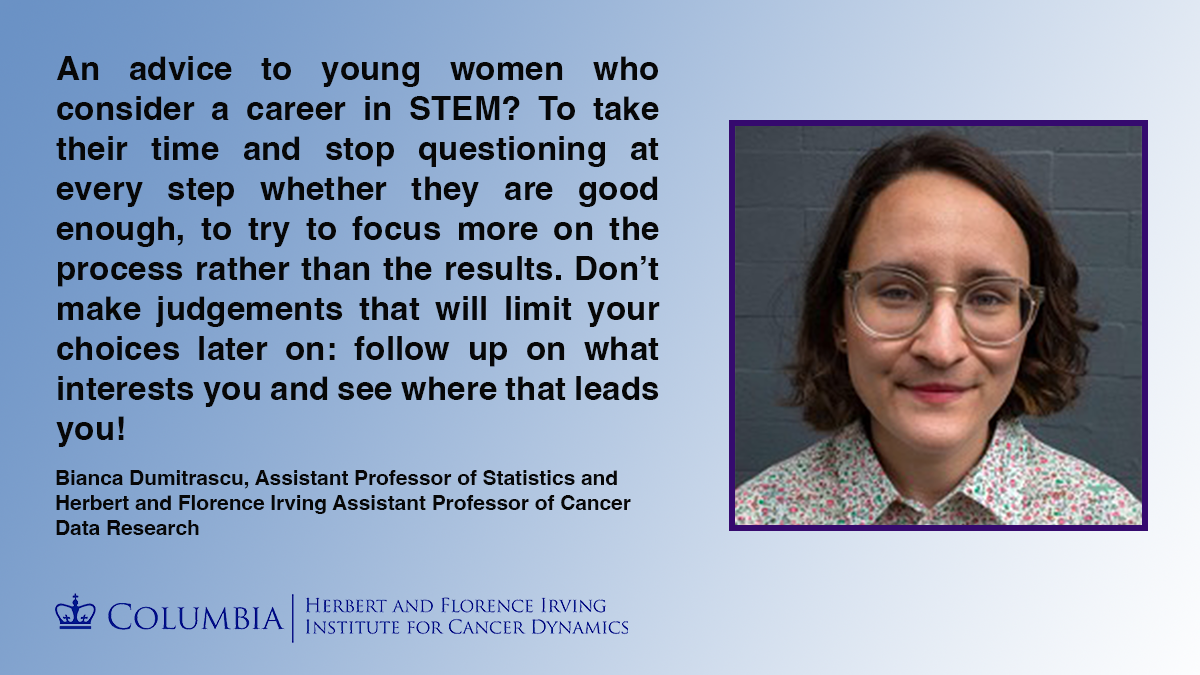
1. Tell us about your background/career path.
I am an applied statistician working on problems motivated by genomics. I am very inspired by the morphology of cells and their collective behavior leading to building living matter. I started off as a mathematics undergraduate student and took an intro genetics class. I was intrigued and I started doing UROPs in computational biology (UROP = Undergraduate Research at MIT). I had a hard time choosing between a PhD in Mathematics and one in Computational Biology. What won me over is a love of interdisciplinary. I have stayed true to that interest throughout my career so far!
2. What inspired you to pursue a career in STEM?
Romania (where I grew up) has a strong culture of mathematics competitions so I got exposed to the idea of studying mathematics through that. My parents have also been a source of great inspiration. I am a first-generation student, but my parents made sure our house was always filled with books on philosophy, science, literature. I learnt about AI from a zine that came with my dad’s sports newspaper sometime in the early 2000s. It was an article about VR and computer vision and how technology allows us to look inside the human body at increasingly precise scales - I thought it was pretty neat!
3. What challenges did you encounter, and how did you overcome them?
I am a very lucky person and I am very grateful for it! Being a woman in STEM can be a challenge sometimes, but we need to keep working hard and pay it forward until there are more of us (and beyond)!
4. What achievement(s)/milestone(s) are you the proudest, career-wise or in your personal life?
There are many!
- Very close tennis matches with Simona Halep in my previous life as an aspiring tennis player - they make for great ice breakers!
- Deciding that I should take a leap of faith and apply to undergraduate programs in the US.
- Completing my first paper, which took a very long time, and during which I contemplated dropping out of my PhD program.
- Not dropping out of my PhD, and graduating!
- Getting my first grant a few weeks ago with a colleague that I find so very inspiring, Dr. Yvon Woappi, also a faculty at Columbia!
5. Do/did you have any role model(s)?
Gigliola Staffilani! Gigliola was my academic mentor at MIT and is someone that continues to be inspirational to me. I am also very inspired by Christiane Nüsslein-Volhard, whom I have never met, but whose research and commitment to helping women in science and to educate the public sets a ridiculously high standard. From years past, Jacques Monod. A dear friend recommended to me his book "Chance and necessity", and I will recommend it to you too now!
6. Would you have any advice for young women who consider pursuing a career in STEM?
To take their time and stop questioning at every step whether they are good enough, to try to focus more on the process rather than the results. It’s easy to say and hard to do. It is a bit of cliche, but research is a process and a marathon, not a sprint. If classes get hard, stick with them, ask for help, give yourself time! Research is also very different from taking classes, so don’t make judgements that will limit your choices later on: if you got a B in a class, but really liked the material, follow up on that interest and see where it leads you!
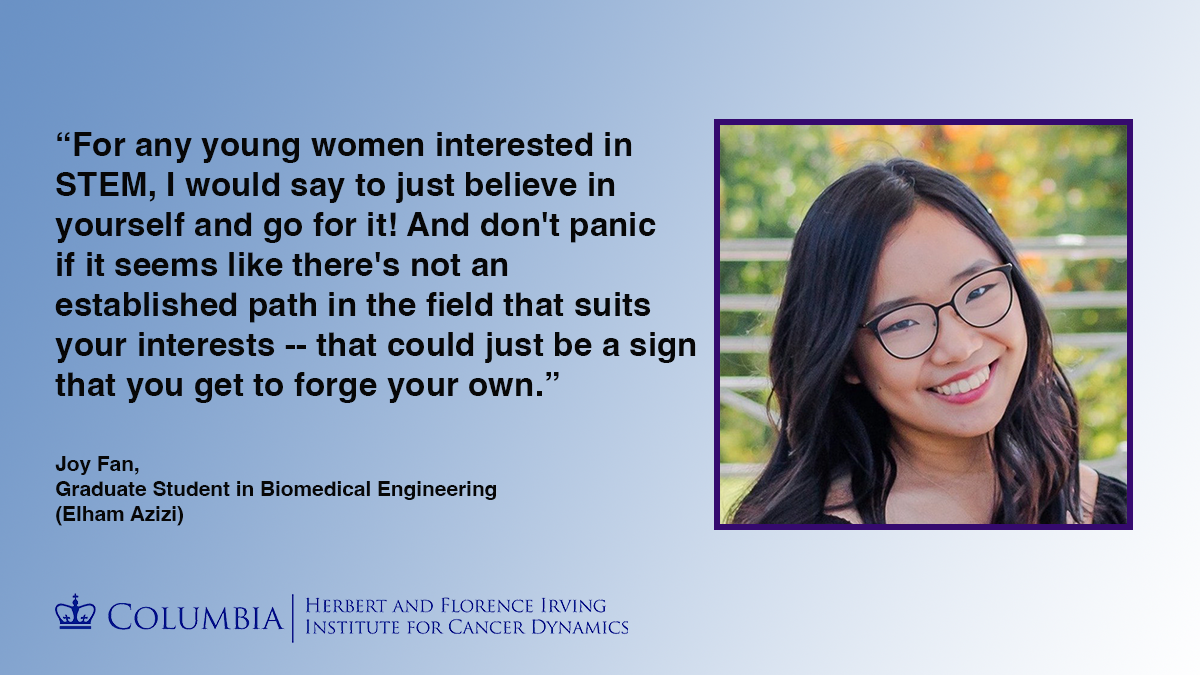
1. Tell us about your background/career path.
My background consists of a mix of experimental biology and machine learning, with more of a focus on the latter since coming to Columbia. It's been my goal to bring cutting-edge statistical and computational tools into the field of cancer research!
2. What inspired you to pursue a career in STEM?
I've always had great encouragement from my parents to pursue STEM, and I discovered my own interest in it during a lab class in high school. The thrill of making new discoveries (however small) was very exciting, and I knew that I wanted to continue doing so with the end goal of helping others.
3. What challenges did you encounter, and how did you overcome them?
It has been challenging to find people within the field who really understand why computational methods are just as important as biological ones. That's why I feel so lucky to be a part of the Azizi lab! It's also been challenging to catch up on all the statistical and computational methods that my peers in computer science were already well familiar with, but that's a challenge I enjoy!
4. What achievement(s)/milestone(s) are you the proudest, career-wise or in your personal life?
My first submission to a major journal was definitely a proud moment. It was awesome to see everything come together, and to have had the experience of working with such an amazing team.
5. Do/did you have any role model(s)?
My research advisor, Dr. Elham Azizi, is my biggest role model. She embodies what I hope to become at the end of my graduate studies: a true expert in both biological and computational methods. She is the person who first showed me that such a balance is possible, and her devotion to transforming the biomedical field into one that includes computation is what inspires me to continue pushing for that myself. She's also just an incredibly kind and supportive person who truly cares about the well-being of those around her!
6. Would you have any advice for young women who consider pursuing a career in STEM?
For any young women interested in STEM, I would say to just believe in yourself and go for it! And don't panic if it seems like there's not an established path in the field that suits your interests--that could just be a sign that you get to forge your own.
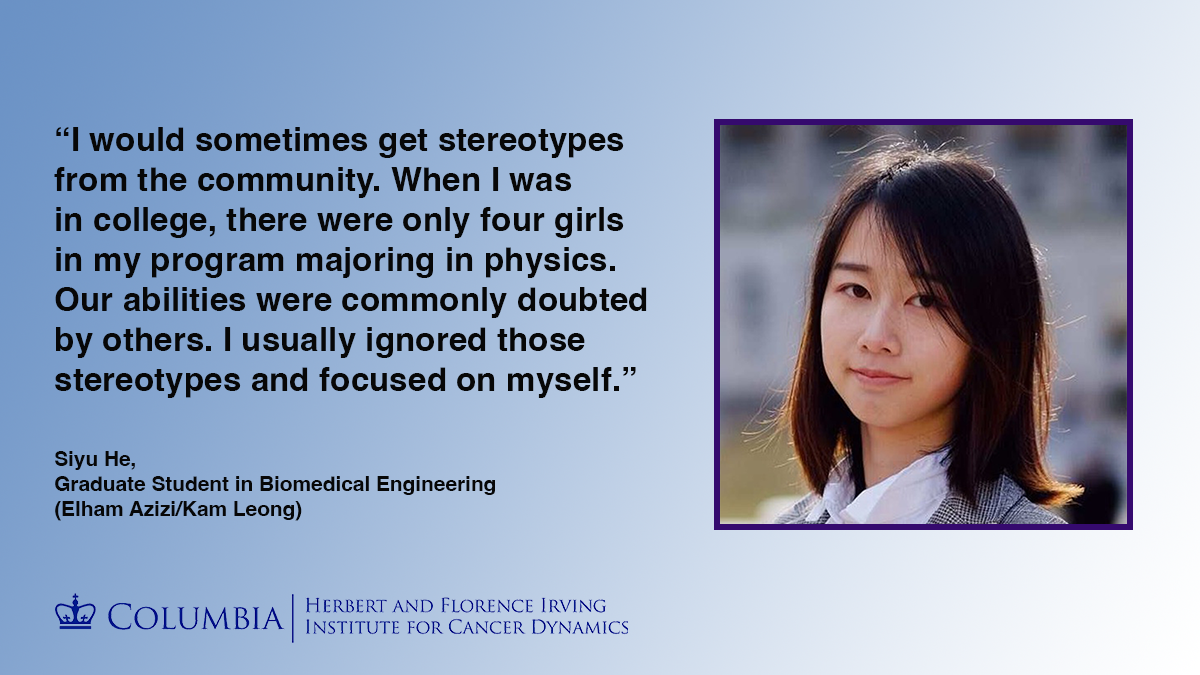
1. Tell us about your background/career path.
I am currently a fourth-year Ph.D. student in the BME department and am jointly mentored by Dr. Kam Leong and Dr. Elham Azizi. My research interests are applying machine learning and single-cell genomic technologies to tissue engineering and cancer dynamics, and to understand the genetic lesion and developmental dynamics of engineered organs, as well as interactions among stem cells and cancer cells. Before my doctoral training, I completed my undergraduate major in physics at Xian Jiaotong University in China, and I have participated in research about astrophysics, quantum optics, and biophysics in some places, such as Texas A&M, MIT, and Harvard. I gradually developed an interest in bioengineering. My career goal is to be an independent researcher in the intersection of tissue engineering and machine learning.
2. What inspired you to pursue a career in STEM?
My high school physics teacher Mr. Ce Sun has impacted me a lot. He inspired my curiosity and confidence in the world of science. I was fascinated by the simplicity and power of physics since it embraces the order of nature with concise theorems. After entering college, I quickly realized the many laws in physics didn't work well when encountering biology as a complex system, and I got attracted by the feeling of unraveling the mysteries in biology and applying them to biomedical applications, especially with a quantitative perspective. During undergraduate and graduate training, I got a lot of support from the school and advisors, and I also met lots of brilliant people who are also enthusiastic about science. I really enjoyed working with them and thus am devoted to pursuing a career in science.
3. What challenges did you encounter, and how did you overcome them?
I would sometimes get stereotypes from the community. When I was in college, there were only four girls in my program majoring in physics. Our abilities were commonly doubted by others. I usually ignored those stereotypes and focused on myself. Other challenges I currently encounter are balancing the time of doing different types of research and being an expert on both computational and experimental aspects. To overcome that, I would make plans ahead, and I would force myself to talk to people on both sides.
4. What achievement(s)/milestone(s) are you the proudest, career-wise or in your personal life?
My curiosity and passion for science never faded.
5. Do/did you have any role model(s)?
Yes, I have many role models and most of them are great female scientists in a wide range of science, such as Dr. Marie Curie, Dr. Youyou Tu, Dr. Fei-Fei Li. And luckily, I am advised by one of my role models, Dr. Elham Azizi, and able to work with her closely.
6. Would you have any advice for young women who consider pursuing a career in STEM?
I would suggest young women interested in working in STEM to believe in themselves, consistently self-improvement, and always get busy. Meanwhile, expose yourself to the circumstances with STEM as much as you can.
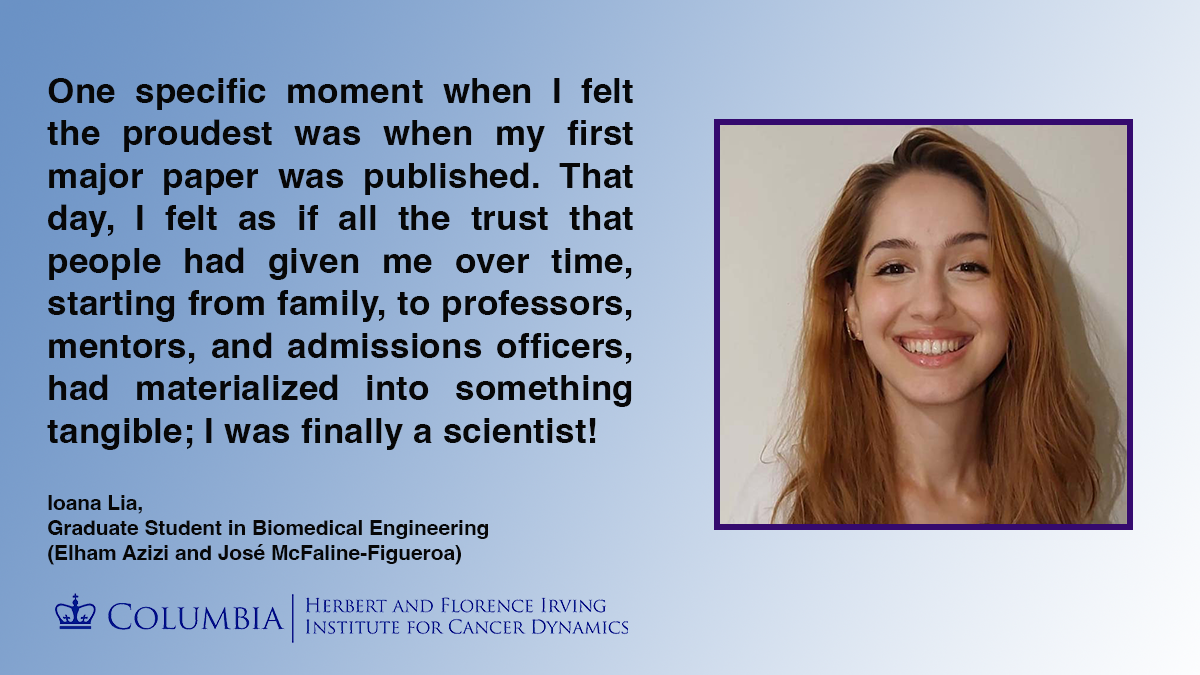
1. Tell us about your background/career path.
I am an MS/PhD student in the Biomedical Engineering department, and I am lucky to be co-advised by Professor Elham Azizi and Professor José McFaline-Figueroa, having just joined both the Chemical Genomics Lab and the Computational Cancer Biology Lab in the fall of 2022. I am originally from Romania, and before starting the PhD program I was an undergraduate at Columbia University, having graduated with a B.S. in Biomedical Engineering in 2021 from Columbia SEAS and a B.A. in Applied Mathematics from Columbia College in 2022. During my time as an undergraduate, I worked in the Synthetic Biological Systems Laboratory, which I joined in February 2018. During my time in Professor Danino’s lab, I was mostly working on engineering bacteria as diagnostic and therapeutic agents for cancer, and the projects I was mainly involved in focused on programming the E. coli bacteria to produce nanobodies that acted as immune checkpoint inhibitors in various cancer types, leading to a more targeted therapeutic delivery. Working in the Danino lab made me very curious about understanding the response of cells to given treatment regimens and the interactions between all the different cell types found in disease states, as well as understanding what informs disease progression. Now, as a PhD student, I am incredibly fortunate to build upon my previous work and study the treatment response at the level of single cells and to gain better insight into cancer progression and cell interactions using machine learning techniques. Of course, none of this would have been possible without the support of the incredible mentors that constantly inspired me.
2. What inspired you to pursue a career in STEM?
When I first discovered science, I was not aware of the biases that women usually face and of all the struggles that they have to overcome in order to pursue a career in STEM. I was also very fortunate to have a family that encouraged me to pursue what I wanted and to make it my mission to excel in whatever I ended up choosing, as long as I tried to push myself to do and to learn as much as I could. When I was 10, I thought it would be fun to participate in Math contests, and that’s how I started really dedicating my free time to studying mathematics on my own, which led me to moving by myself to Bucharest to join my high school’s olympics’ class, which provided us with the opportunity to take intense math classes and to focus on learning as much as possible about science. I became interested in applying the mathematical concepts I loved to solve real world problems and that’s how I discovered biomedical engineering, started to do some genetic research in high school and eventually joined Columbia to learn even more about how I could contribute to this very exciting and quickly expanding field of research. Over time, I realized that pursuing a career in biomedical engineering would combine all my interests as well as my detail oriented and problem-solving nature, creativity and desire for finding pragmatic solutions.
3. What challenges did you encounter, and how did you overcome them?
The most obvious challenge I encountered doing research was being comfortable with the unknown, without feeling overwhelmed about everything there is to discover at any given point in a project. Working in the scientific field quickly taught me to be better at planning and to work more efficiently. Dividing all seemingly impossible projects into small tasks and learning how to plan appropriately and how to schedule experiments is key. On a more personal note, I was surprised to find out that sometimes in the scientific community there is some bias about how a scientist chooses to present themselves in terms of physical appearance and their perceived worth as a researcher, especially in the case of women in science. These attitudes only made me trust myself more and made me understand how important representation in the scientific community is, especially for young girls interested in STEM, but who might think they need to change in order to fit in; this is the main reason why I am now volunteering for the semesterly Girls’ Science Day at Columbia.
4. What achievement(s)/milestone(s) are you the proudest, career-wise or in your personal life?
Whenever I look back, I am very proud of my overall trajectory in life: I grew up in a small town in the south of Romania and now I have the incredible opportunity to do research in a massively challenging field, while combining my passions and helping others. If I were to point to a specific moment when I felt the proudest, from a scientific lens, I would say it was in February 2020 when my first major paper was published in Science Translational Medicine and I was listed as the second author. That day I felt as if all the trust that people have given me over time, starting from family, to professors, mentors, and admissions officers who appointed me as a C.P. Davis scholar as part of the Columbia Undergraduate Scholars Program back in 2017, has materialized into something tangible; I was finally a scientist.
5. Do/did you have any role model(s)?
I have been very honored to work with incredible people throughout my life and have always tried to find at least a role model that would inform my decisions at any given point. As a child, I was looking up to various family members who taught me that it’s never too late to learn about a new topic, that you should never be afraid to tackle the most creative and challenging projects, and that you are allowed and even encouraged to dream big and work hard. More recently, there are several incredible women in science who have guided me throughout the years, and I am particularly grateful for the help that my graduate student mentor, Dr. Candice Gurbatri, has given me during all my undergraduate years, and to Professor Elham Azizi, who is a true inspiration, an incredible example, and who shows me every day how important it is to be resilient, passionate, motivated and curious about research.
6. Would you have any advice for young women who consider pursuing a career in STEM?
Don’t listen to everything that everyone has to say, trust yourself, be curious and always stand up for yourself and for what you believe in! Your voice matters more than you think so try to bring your own unique perspective into the specific STEM field you’re interested in pursuing. Also don’t be afraid to fail, you’ll learn a lot that way!
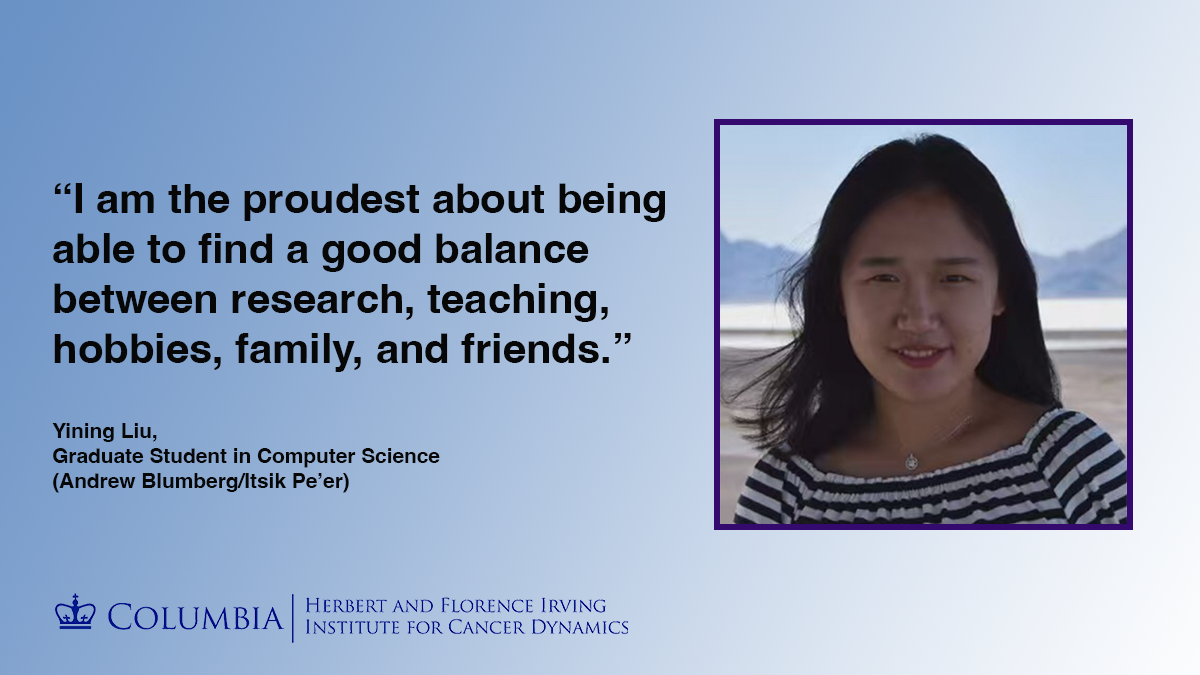
1. Tell us about your background/career path.
My undergraduate study is in mathematics, and I am currently a PhD student in computer science. I became interested in computational biology research when I interned in Nir Yosef's lab while I was a sophomore in college.
2. What inspired you to pursue a career in STEM?
Towards the end of my undergraduate studies, I got interested in the applications of topology and geometry. Since I have always been interested in science, I became fascinated by the recent research on analyzing biological data using topology and geometry.
3. What challenges did you encounter, and how did you overcome them?
I initially wanted to pursue a PhD in mathematics, and the decision of pursuing a PhD in computer science/computational biology was a tough decision. I am grateful for the encouragement from my friends, family, and mentors that supported me to make the switch.
4. What achievement(s)/milestone(s) are you the proudest, career-wise or in your personal life?
I am the proudest about being able to find a good balance between research, teaching, hobbies, family, and friends.
5. Do/did you have any role model(s)?
My advisors are two of my role models. Their dedication towards science and wide range of knowledge always inspires me to become a better person.
6. Would you have any advice for young women who consider pursuing a career in STEM?
Keep pursuing your interests and careers that you find to be valuable!
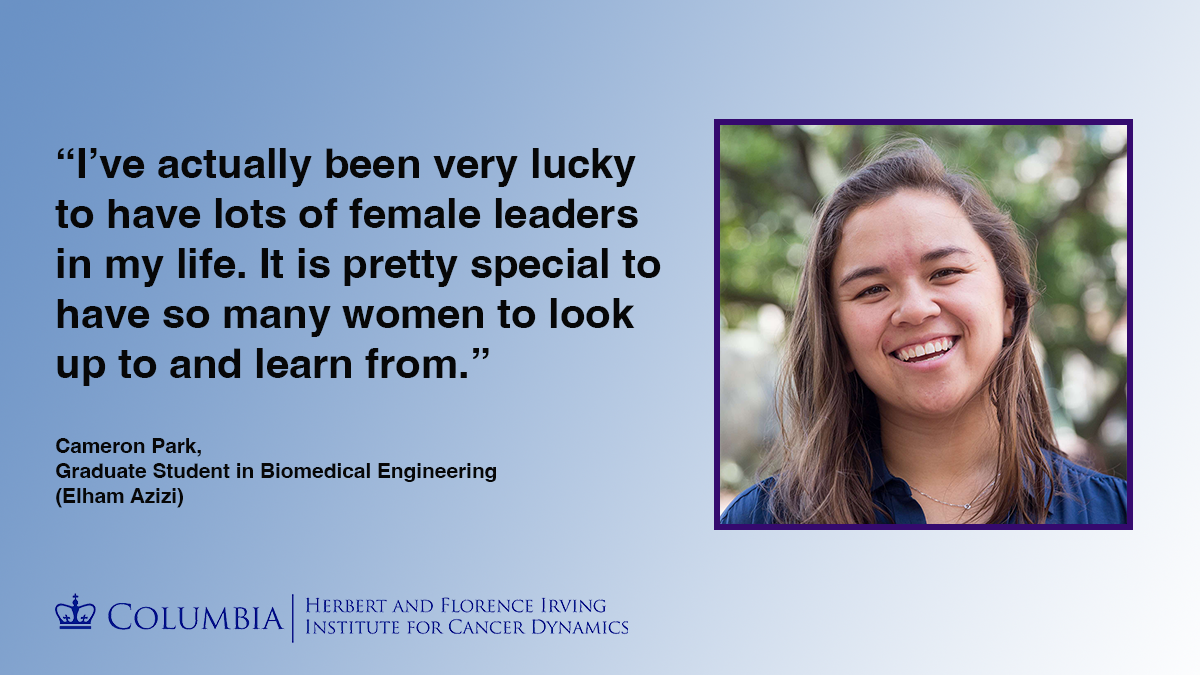
1. Tell us about your background/career path.
I grew up in Walpole, MA, a small town outside of Boston. Before Columbia, I went to Stanford for college and double majored in physics and human biology. I also played on the varsity women's lacrosse team, and we were Pac-12 champions my senior year! Upon graduating, I stayed for two years for my master's degree in Bioengineering, and worked in Irving Weissman's lab studying stem cells in the brain. Fun fact, I have a twin sister! (and we are polar opposites).
2. What inspired you to pursue a career in STEM?
I have always loved science. For the longest time, I thought I would have a career in physics. I loved space and learning about planets. In college I realized I wanted to pursue a field that could be applied more immediately to actually improving people's lives. For me, the draw to biomedical engineering really stems from the impact our research can have. It is such an interdisciplinary and creative field, and I really love that we get to work on problems in cancer biology from so many different angles.
3. What challenges did you encounter, and how did you overcome them?
My PhD process was a big challenge for me. I did not have extensive research experience (playing lacrosse in college did not leave much time for anything else), and I found it hard to find a program that would be willing to take a chance on me. I believed I was a good candidate, but it was hard to show that on a resume, and I faced a lot of rejections. I look back on that now, and it really could not have worked out better and I am so grateful to be a part of such a great lab with so many brilliant students. The struggle of the application process makes me appreciate where I am now.
4. What achievement(s)/milestone(s) are you the proudest, career-wise or in your personal life?
Career-wise, I am proud of my double major in college (one of <30 double majors in my graduating class) and currently really proud of getting to be in Elham's lab and how much I have learned throughout my PhD! In my personal life my proudest achievements include walking onto the lacrosse team my freshman year of college, finishing 4 years of Division 1 lacrosse, running a trail marathon on my 24th birthday, and completing a half ironman this past December.
5. Do/did you have any role model(s)?
I’ve actually been very lucky to have lots of female leaders in my life. My lacrosse coach in college was female, as were our trainers. During my master's, I worked for a female MD-PhD student. And now, I get to work in a lab led by an incredible female PI. Elham is a great role model, and I am grateful that I can learn from her. It is pretty special to have so many women to look up to and learn from. Most of all, my biggest role models would be my parents, who have been a rock in my life and taught me to work hard, believe in myself, and have supported me throughout my entire academic journey.
6. Would you have any advice for young women who consider pursuing a career in STEM?
Go for it. Regardless of how hard it is or whether other people think you can do it. If it is important to you, don't let anyone tell you that you can't do it.
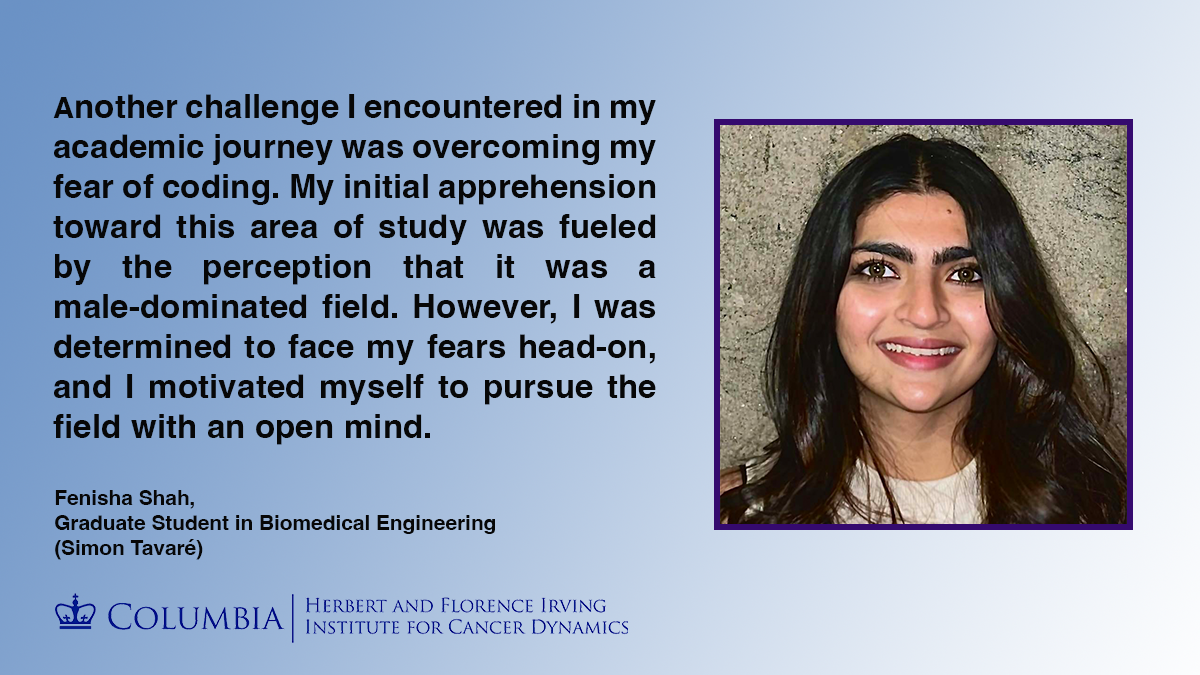
1. Tell us about your background/career path.
I embarked on my academic journey as a microbiology major with aspirations to become a medical professional. However, it soon became apparent to me that my passion lay in problem-solving and honing my critical thinking skills, which I found to be stimulated in my math and physics coursework. Consequently, I made a pivotal decision to shift my academic focus and pursued a degree in electrical engineering. Upon completing my undergraduate degree in electrical engineering, I gained a profound appreciation for the application of my skills in the healthcare sector. Given my desire to be a part of positive change in healthcare, I was impelled to pursue a master's degree in biomedical engineering at Columbia University, with a particular focus on bioinformatics.
2. What inspired you to pursue a career in STEM?
Growing up in a family of physicians and engineers instilled in me a deep appreciation for the power of science and its capacity to make an impact. However, it was the unwavering influence of my father, a successful entrepreneur with a keen interest in science, that inspired me to pursue a career in this field. My father would immerse himself in articles detailing the extraordinary achievements of the world's greatest scientists, their work, and the lifestyles they led. He would recount these stories to me with great enthusiasm, encouraging me to strive for greatness in my own scientific pursuits and to leverage my abilities to contribute to the betterment of society. It is through his unwavering support and belief in me that I am propelled to pursue excellence in the scientific realm and make a meaningful impact on the world.
3. What challenges did you encounter, and how did you overcome them?
One of the significant challenges I encountered early on in my STEM career was identifying my true calling. The field of science encompasses a broad spectrum of disciplines, each requiring distinct skills and methodologies. During my undergraduate studies, I embarked on a journey of exploration, attending classes in mechanical and electrical engineering, computer science, industrial engineering, and biomedicine, among others. This exposure proved instrumental in enabling me to discern my interests and aspirations, guiding me toward the path that would define my professional trajectory. I am tremendously grateful for the opportunity to have undergone such a transformative experience, which has culminated in my current pursuit of computational biology. I am motivated by the potential impact this field holds in transforming the approach to scientific inquiry, and I am honored to play a role in advancing its possibilities.
Another challenge I encountered in my academic journey was overcoming my fear of coding. My initial apprehension toward this area of study was, in part, fueled by the perception that it was a male-dominated field, as well as my experience with dyslexia as a child. During my undergraduate studies, I was required to enroll in courses that involved coding, and I would frequently seek the help of my peers, given my insecurities. However, I was determined to face my fears head-on, and I motivated myself to pursue the field with an open mind. In preparation for my graduate studies, I embarked on an online coding course, and within a short period, I made significant strides in my proficiency. Today, I am proud to have mastered various coding techniques, and I am confident in my abilities to tackle any challenge that comes my way. The journey to overcome my fears was undoubtedly arduous, but the results have been rewarding, and I am excited to utilize my newfound skills to contribute to the field of computational biology.
4. What achievement(s)/milestone(s) are you the proudest, career-wise or in your personal life?
I am confident that my career will be fulfilling, and I will take great pride in the work I accomplish. However, I consider my most significant accomplishment to be the internalization that setbacks are an inherent part of both life and scientific research, and it is crucial to acknowledge and learn from them to advance in the direction you desire. This mindset has been instrumental in my personal growth and professional development, and I look forward to applying it to my future endeavors.
5. Do/did you have any role model(s)?
Dr. Elham Azizi's work at IICD was an incredible source of inspiration for me, and it continues to be to this day. Long before I commenced my studies at Columbia, I chanced upon her research while browsing the university's faculty page. Immersing myself in the lab's groundbreaking work, I sought to educate myself on some of the computational techniques employed at the lab. For me, Dr. Azizi plays a powerful woman in STEM, and her work has had a profound impact on my life. As a budding scientist, I have been searching for a mentor to help guide me on this journey of discovery. While I have yet to find that person, I am committed to pursuing my passion and learning as much as I can from trailblazers like Dr. Azizi. Her work has become a beacon of hope for me, and I aspire to make a similar impact in the world of science one day.
6. Would you have any advice for young women who consider pursuing a career in STEM?
There is nothing in this world that can't be achieved if you put your heart, mind, and soul into it.
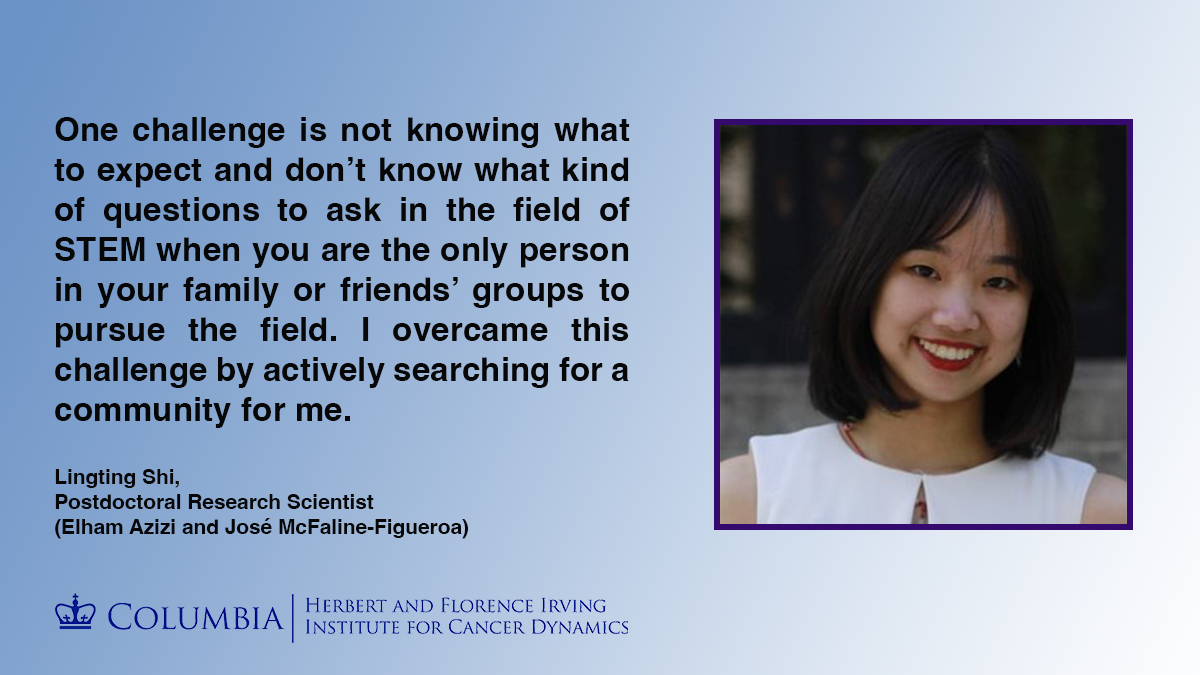
1. Tell us about your background/career path.
I am a postdoc in the Chemical Genomics lab headed by Dr. McFaline-Figueroa and Computational Cancer Biology Laboratory headed by Dr. Elham Azizi, focusing on studying tumor-immune interaction experimentally and computationally. I received a BS in biomedical engineering at Rutgers University, where I worked on developing an in vitro approach to identifying skin sensitizers with machine learning tools in Dr. Martin Yarmush’s Lab. Then for my Ph.D. degree, I joined Dr. Lance Kam’s lab at Columbia BME to study the mechanosensing of regulatory T cell induction for the generation of Tregs to treat autoimmune diseases. My passion for science grew over the past eight years of my research career, and I owe all my previous mentors and current mentors a huge thank you for supporting my endeavor in research.
2. What inspired you to pursue a career in STEM?
I naturally enjoy the process of problem-solving, and I always love to push the limits of my understanding of STEM. Thus, I fall in love with coding, and I also find the complexity of human bodies especially the immune system fascinating. What I am doing now perfectly combined both my interests, which makes my work very enjoyable.
3. What challenges did you encounter, and how did you overcome them?
There are many challenges along the way. The first one is imposter syndrome. I learned to not overthink, and just understand what is need to be done and try my best to do them. The other challenge is not knowing what to expect and don’t know what kind of questions to ask in the field of STEM when you are the only person in your family or friends’ groups to pursue the field. I overcame this challenge by actively searching for a community for me. In my case, everyone in my undergraduate lab helped me navigate college and graduate school tremendously. Lastly, changing fields is also a bit challenging, but I learned to be comfortable in an uncomfortable situation where you are the one who knows the least of the subject in the room and don’t mind putting in extra hours of solid work to catch up.
4. What achievement(s)/milestone(s) are you the proudest, career-wise or in your personal life?
I am proud of myself for always being passionate about what I do, enjoying constantly learning in my field and outside of my field, and pushing the limits of my understanding of what I can do in my life.
5. Do/did you have any role model(s)?
I always have someone to look up to in every phase of my life, and currently, my role model is my mentor Dr. Elham Azizi. I love how passionate and dedicated she is to her research. She works extremely hard to create a collaborative and welcoming research environment for everyone in the lab as well as other people in the field.
6. Would you have any advice for young women who consider pursuing a career in STEM?
Don’t let other people define who you are and what you can do in your life. It should be you deciding who you want to be and what to do with your life.
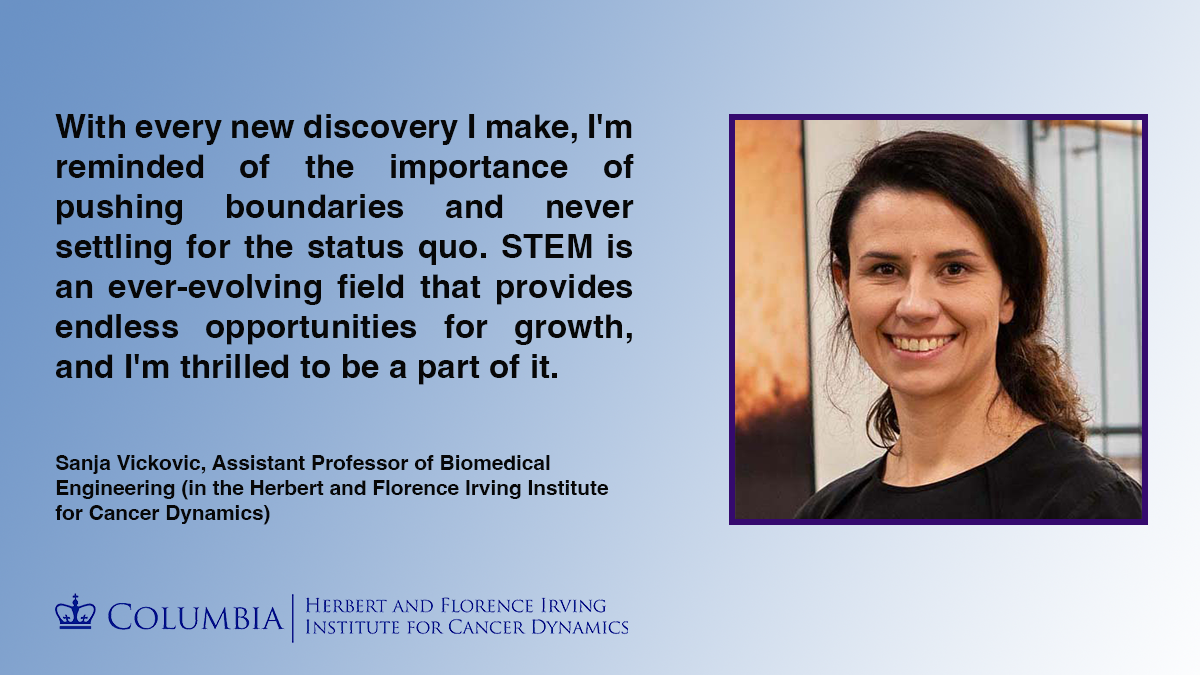
1. Tell us about your background/career path.
I was born and raised in Croatia and pursued a professional ice hockey career, which brought me to Stockholm as part of the Croatian National Team Women’s Ice Hockey from 2005 to 2012. While in Stockholm, I joined an experimental genomics lab at the Royal Institute of Technology, where I focused on technology development. After obtaining a BSc in bioengineering from the University of Zagreb I earned a MSc in Molecular Biotechnology and a PhD in Genetics at the Royal Institute of Technology. Following my graduate work, I joined the Broad Institute of MIT and Harvard as a Wallenberg Fellow, which provided me with the opportunity to pursue my independent research to build the foundation of my lab. I joined Columbia University on July 1st as an assistant professor of biomedical engineering in the Herbert and Florence Irving Institute for Cancer Dynamics, where I focus on developing accessible genomic methods for use in clinics. Additionally, I have an appointment at the New York Genome Center as a Core Faculty and the Director of the Technology Innovation Lab.
2. What inspired you to pursue a career in STEM?
My desire to learn and explore has been a driving force throughout my life, and it is this same curiosity that has led me to pursue a career in STEM. I'm passionate about discovering new solutions to old problems, and I'm excited to explore the world of science, technology, engineering, and mathematics. I'm eager to use my knowledge and skills to create meaningful innovations that will have a positive impact on our world. With every new discovery I make, I'm reminded of the importance of pushing boundaries and never settling for the status quo. STEM is an ever-evolving field that provides endless opportunities for growth, and I'm thrilled to be a part of it.
3. What challenges did you encounter, and how did you overcome them?
As science and engineering professionals, we are often faced with daunting challenges. But I'm lucky to have been trained in supportive and inclusive environments that recognize the value of every individual, no matter their gender identity. This experience has given me a unique insight into the significance of viewing our scientific peers as equals and providing them with ongoing support through collaboration. By taking this approach, we can ensure that our work remains rooted in scientific principles, resulting in greater rewards for all involved. In my lab, we place a strong emphasis on personal and scientific growth for each team member, something that isn't always the case in other settings. Nevertheless, we have the power to choose who we work with and how we interact, in accordance with our values, and in doing so, we can build a better scientific community for everyone.
4. What achievement(s)/milestone(s) are you the proudest, career-wise or in your personal life?
Professionally, I'm proud of the fact that I've been able to build a career in a competitive field and have been able to make a name for myself. I'm also proud of the relationships I've been able to form along the way, with colleagues and trainees alike. On a personal level, I'm proud of all the milestones I've achieved - from a successful hockey career to learning a completely new set of skills in genomics and engineering. I'm also proud of my ability to stay focused on my goals and ambitions, despite any challenges or obstacles that may arise. It's been a rewarding journey so far and I'm looking forward to what comes next!
5. Do/did you have any role model(s)?
First and foremost, my mom. I know this might come as a cliché, but I truly admire my mom for so many reasons. First and foremost, she is the epitome of strength and resilience. Despite facing numerous personal and professional challenges throughout her life, she has always managed to pick herself up and keep going, never losing sight of her goals and always striving to do better. She has also been an incredible role model to me, instilling in me the importance of hard work, perseverance, and kindness. Additionally, she is one of the most selfless people I know, always putting the needs of others before her own and going out of her way to help those in need. Her unwavering dedication to her family and friends is truly inspiring, and I feel incredibly lucky to have her as my mom.
6. Would you have any advice for young women who consider pursuing a career in STEM?
Advice I would give to young women who consider pursuing a career in STEM is to focus on building a strong foundation of knowledge and skills in their field; not to be afraid of challenges or setbacks since they are a natural part of the learning process and to be persistent. And network since a strong network of peers and colleagues can help you stay connected to opportunities and keep you motivated.
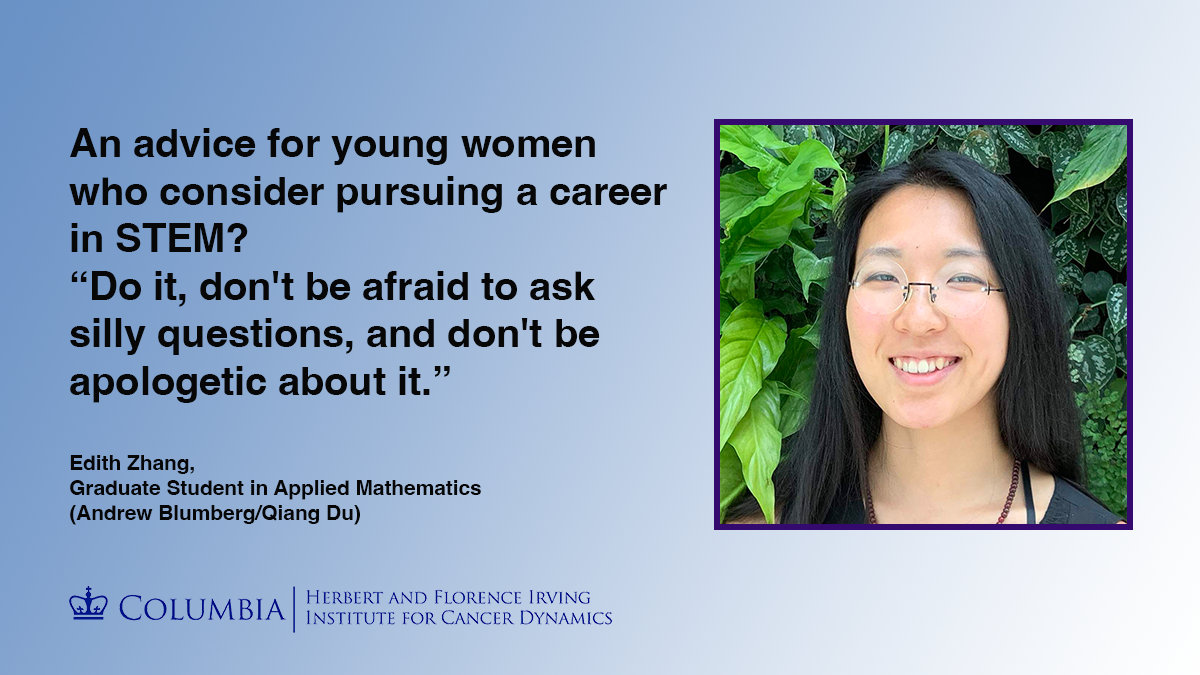
1. Tell us about your background/career path.
I was a math major at UVA. I'd done some research relating to group theory, and helped a professor with some simulations of random dynamics. At Columbia I have done work relating to variational inference, a statistical inference method, and am now working in the intersection of geometry, probability and partial differential equations. I'm not sure about the future but would like to continue researching.
2. What inspired you to pursue a career in STEM?
I like learning. I jumped between different majors until I settled on math in my junior year at UVA. With this short amount of time, I still didn't feel that I understood what math really was. I had heard an analogy that goes "math is like basketball, except that for years, you can only do drills and workouts without playing the game. When you're finally good enough to play the game is when it becomes fun." So I decided to stick with it and find out what the fun was like.
3. What challenges did you encounter, and how did you overcome them?
I hit challenges every day and am still learning how to overcome mathematical blockedness. I'm discovering that I like having two projects at once, and switching between them regularly keeps me fresh.
4. What achievement(s)/milestone(s) are you the proudest, career-wise or in your personal life?
I can't think of a single achievement or milestone, but I'm proud of my persistence and durability.
5. Do/did you have any role model(s)?
I greatly admire the mathematician Ken Ono (who joined UVA right as I left). He and I were both not very motivated students early on and late bloomers in our mathematical careers, as well as avid cyclists. I like that he carves his own path and has priorities other than mathematical prestige.
6. Would you have any advice for young women who consider pursuing a career in STEM?
Do it, don't be afraid to ask silly questions, and don't be apologetic about it.
